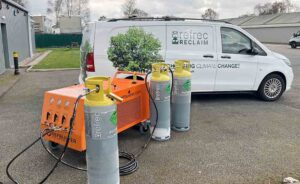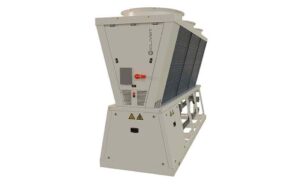Developing refrigeration with “muscle”
3rd February 2016 GERMANY: Refrigeration using shape memory materials could be the energy efficient, refrigerant-less means of cooling in the future, according to scientists.
GERMANY: Refrigeration using shape memory materials could be the energy efficient, refrigerant-less means of cooling in the future, according to scientists.
Professors Stefan Seelecke and Andreas Schütze from Saarland University, working in conjunction with materials scientists Gunther Eggeler and Jan Frenzel at Ruhr University Bochum, are developing a new method of cooling in which heat and cold are transferred using ‘muscles’ made from a nickel-titanium alloy.
Extensive tests have yielded results that are now being used to develop a prototype cooling circuit that will be used to further increase the efficiency of the process. The German Research Foundation (DFG), which has been funding the project for the last three years, has agreed to invest a further €500,000. In total, the project has attracted around €950,000 in funding.
The cooling process that they are developing does not require refrigerants and is expected to consume less energy than conventional cooling technologies.
“In our systems, shape memory alloys (SMAs) are used to remove heat,” explains Stefan Seelecke. “Shape memory means that wires or sheets made from a nickel-titanium alloy have a certain ability to remember their original shape. If they undergo deformation, they will return to their earlier shape. So they are able to tense and flex like muscles. The fact that they absorb and release heat when they do so is something we exploit to achieve cooling,” he explained.
If a nickel-titanium wire or sheet is deformed or pulled in tension, the crystal lattice structure can change creating strain within the material. This change in the crystal structure, known as a phase transition, causes the shape memory alloy to become hotter. If the stressed sample is allowed to relax after temperature equalisation with the environment, it undergoes substantial cooling to a temperature about 20º below ambient temperature.
In the experimental and modelling studies carried out so far, the researchers at Saarland University and the Center for Mechatronics and Automation Technology (ZeMA) in Saarbrücken claim to have demonstrated that this type of cooling works and that it can be used in practice. They used a model system to determine how to optimise the efficiency of the cooling process, examining such factors as how strongly the material has to be elongated or bent in order to achieve a certain cooling performance, or whether the process is more effective when carried out slowly or more rapidly. A thermal imaging camera was deployed to analyse precisely how the heating and cooling stages proceed.
“We’re currently using these results to construct an optimised prototype for an air-cooling system. We are creating a cooling cycle in which hot air passes over one side of a rotating bundle of shape memory wires. Multiple wires are used in order to enhance cooling power. The bundle is mechanically stressed on one side as it rotates, thus heating up the SMA wires, as it rotates further the SMA relaxes and cools. The air to be cooled is guided past the cold wire bundle, thus cooling an adjacent space,” says Professor Schütze.
The team of engineers are currently fine tuning the process to optimise its efficiency. Further optimisation of the cooling process will involve modelling all component stages and then refining these models by comparing the predictions with experimental results.
“The data from the modelling and experimental work should allow us to determine the ideal number of shape memory wires for our rotating wire bundle as well as the optimum speed of rotation,” explains Schütze.







